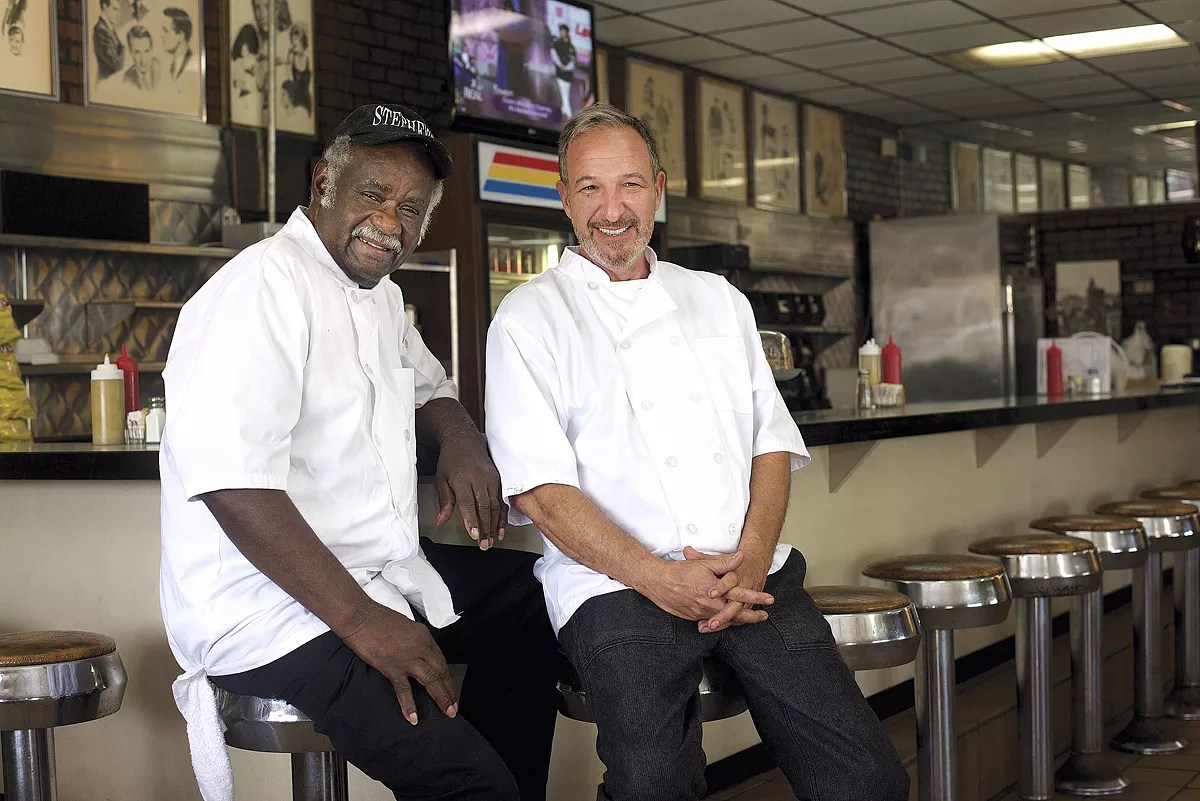

Audio By Carbonatix
Stephen’s Restaurant is nestled on East 16th Street in Hialeah between a bright-yellow cafeteria and an aging warehouse. On a Friday at 10 a.m., muffled rock ‘n’ roll can be heard outside, where Jack Frisch, the owner of Stephen’s, smokes a cigarette. He’s dressed in a bleached-white chef’s jacket and stained black jeans.
As a kid, he waited tables in the Catskills, where he befriended comedian Danny Kaye.
Henderson “Junior” Biggers, a slender 80-year-old with curly snow-white hair, approaches.
“Hi,” Frisch says with a look that reveals they know each other so well that no other greeting is necessary.
Biggers smiles wordlessly and continues inside.
Stephen’s is a weathered but charming Jewish-style deli that hasn’t changed much since opening in 1954. Though its stoves, fridges, and dishwashers are beaten up from years of use, the kitchen is impeccably clean.
Five hours earlier, Frisch placed a half-dozen glistening chunks of peppered pastrami and prime corned beef into a shiny steam box about the size of a high-school locker. The box slow-cooked the meat, morphing each chunk into a moist, tender block.
Grasping a long, thin knife, Biggers opens the doors to the box. A warm fog envelops him and three other workers. Biggers carefully removes the large masses and places them on a yellowed cutting board.
For the next three hours, he will return to this carving station every ten minutes or so. He doesn’t need the sharp, 12-inch blade; the meat slides off like butter. After seven or so slices, he slaps two pieces of rye bread on each side, adds a pickle, and sends it to the dining room.
Through flimsy double doors, a stained-glass sign embossed with “Stephen’s Restaurant” hangs over the dining room, which is filled with salespeople, police officers, and elderly couples.
Listed inside a frayed leather-bound menu is the Rachel, stuffed with pastrami, Swiss cheese, and sauerkraut; the Reuben, which swaps pastrami for corned beef and Thousand Island dressing; and the Spa, a wrap filled with field greens, turkey, avocado, and raspberry vinaigrette, which is meant to cater to young and health-conscious customers who don’t understand the draw of a blood-red-meat sandwich.
Three TV sets hang on the restaurant’s vintage wooden walls, but most of Stephen’s is filled with hand-drawn sketches of celebrity visitors from years past, including James Dean and Marlon Brando.
These days, though, the famous rarely come here. Of course, every now and then, Biggers serves his grandson, homegrown Miami Heat player Udonis Haslem, but that barely counts.
Biggers grew up in Union Springs, Alabama, where he never heard the word “deli” or met a Jewish person. He’s soft-spoken and stays focused on his work. “I make about 120 sandwiches a day,” he says with a smile. “I never would have thought this is what I would be doing at my age.”
Biggers has worked at Stephen’s for 60 years. Besides cutting meat, he hand-rolls thick spheres of matzo meal, oil, and egg for matzo ball soup. He also fries potato pancakes to a golden brown without overcooking the doughy center.
“I got a job as a dishwasher here in 1957,” he says. “The cook at the time was a real drunk. The owner told me to observe and learn everything I could because there’s always a demand for good cooks.”
Biggers is a walking, talking metaphor for the long-lived deli industry that once was the bedrock of Miami’s dining scene. Corned beef, blintzes, and matzo ball soup were the heart of menus at places such as Wolfie Cohen’s Rascal House in Sunny Isles Beach, Pumpernik’s on 67th Street in Miami Beach, and Corky’s in North Miami Beach. But as Jews passed away or moved north to cities such as Fort Lauderdale and Boca Raton, the scene faded.
Recently, though, there has been a renaissance. Stephen’s, the oldest operating deli in Miami-Dade, is gearing up for a large-scale renovation that will add a craft cocktail bar. Over in Aventura, Bagel Cove is now open 24 hours, serving matzo ball soup after the bars close. And Zak Stern, who opened a wildly popular Wynwood bakery, has embarked on a new path: to bring back the authentic foods of old-school delis like smoked fish salad and tongue tartines.
All of them hope to preserve Miami’s long-lived deli culture.
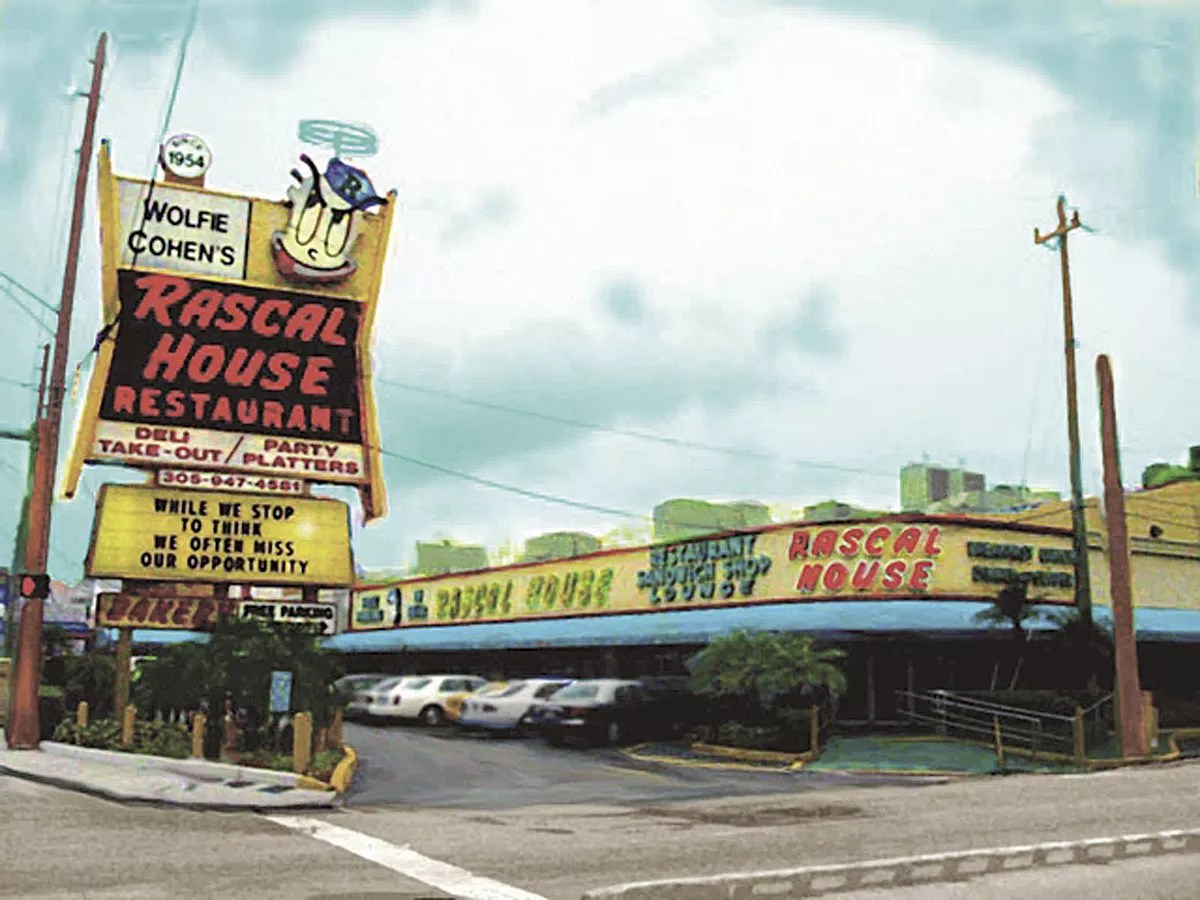
Wolfie Cohen’s Rascal House was a dominant force on Miami’s deli scene for decades.
Photo via Wikimedia Commons
In the 1950s, you could find a line of gray-haired men in sizable glasses and short-sleeved, button-up shirts at nearly any time of day at 21st Street and Collins Avenue in Miami Beach. Next to them stood ladies in ankle-length skirts and white-pearl necklaces.
They were all waiting to enter Wolfie’s, the center of Miami’s cacophony of overcooked meat, potato-based plates, and baked dough. The scene was vibrant and colorful, much like its big macher, Wolfie Cohen.
Cohen, a handsome guy with P.T. Barnum charisma, was responsible for opening some of Miami’s most famous delis, including Wolfie’s and later Wolfie Cohen’s Rascal House. He wore shiny square glasses that sat on his floppy ears and across his wide nose. His mouth was small, but when he spoke, he was a giant. “He was bigger than life,” says Jerry Cohen, who handled construction for Wolfie Cohen’s first Miami Beach deli but is not related to him. “When I worked with him, he dominated every room he came in. He dominated all of his restaurants. Everyone wanted to be friends with him.”
Even before Wolfie, at the turn of the 20th Century, Jewish people were drawn to South Florida by the chance at a better life. “Everyone was hearing stories about Henry Flagler extending the railroad to Biscayne Bay,” says author Seth Bramson, who recalls Cohen as a mentor. “That meant business, and with business came opportunity.”
It was the era of segregation, and Jews were forbidden from owning land, renting hotel rooms, or even swimming in some places, but they nevertheless flourished by helping to create organizations such as the Miami Chamber of Commerce in 1907.
To serve this population, Rosedale, most likely the first delicatessen in Miami, opened in 1925 on Washington Avenue at 15th Street in South Beach. Some time later, the deli moved to its longtime location on NW Fifth Street in downtown Miami, according to Bramson. Although the Jewish community was relatively small, it was large enough that consistent crowds streamed in for overstuffed sandwiches on rye bread.
Rosedale was followed by a long list of other New York-style delis, including Al Nemets’, Mammy’s, Pappy’s, and Manny’s. They dotted Miami Beach.
But beginning in the 1940s, it was all about Cohen, who was born in Schenectady, New York, in 1912 as Wilfred Cohen, Bramson says. As a kid, Cohen sold ice cream and then waited tables in the Catskills, where he befriended up-and-coming comedian Danny Kaye.
Before moving to Miami Beach in the 1930s, he was a partner at Leb’s, a Jacksonville deli. In the late ’40s, he hooked up with business partner Bill Sherman to open Wolfie’s on 21st and Collins.
“Sherman really ran the show,” Jerry Cohen says. “He decided there would be a sandwich counter in the front and how the kitchen would run.”
Posting large signs on Collins Avenue, they held a contest to name the restaurant. “A kid from the University of Miami came up with the name ‘Wolfie,'” Jerry Cohen remembers. “That was the name they went with, inspiring Wilfred to legally change his name to ‘Wolfie.'” (Not much about Wolfie Cohen is clear, though. An obituary in the Miami Herald reported he was born “Wolfe Fred.”)
The 24-hour delicatessen catered to Jewish New York transplants and theater junkies hungry for a postshow meal. It displayed a massive, sparkling red-and-green neon sign that shed light on one of South Beach’s busiest stretches. The place served breakfast, lunch, and dinner in large dining rooms filled with blue-and-red vinyl booths. The walls were filled with signed photos of famous personalities.
“Wolfie Cohen was like a celebrity,” says Ted Merwin, a deli historian and author of Pastrami on Rye: An Overstuffed History of the Jewish Deli. “He was definitely part of the attraction and why many people wanted to eat there.”
In 1951, Cohen opened Pumpernik’s at 67th Street and Collins Avenue. Named for a cartoon character, the deli would later become the birthplace of Larry King’s television and radio career. Bobby Darin, Frank Sinatra, Sammy Davis Jr., and Jackie Gleason were interviewed there.
Also in the early 1950s, Cohen opened the Rascal House in Sunny Isles Beach on the site of a former Pumpernik’s. It was his highest-volume deli, with more than 400 seats. On opening day, every customer was treated to a free meal. Hundreds lined up outside.
“Wolfie had an unerring sense of what was going to happen in the restaurant industry,” Bramson says. “The motel boom was just beginning, and there were very few traffic lights up and down the Beach, making it really easy to get to.”
Similar restaurants opened across South Florida, including Raphil’s, on what is now the site of a Roasters ‘n Toasters; Junior’s; a second, unrelated Wolfie’s at Lincoln Road and Collins Avenue; Stephen’s in Hialeah; and Corky’s in North Miami Beach.
“After World War II, Miami was one of the Jewish homelands,” says Ira Sheskin, chair of the geography department at the University of Miami, “and that brought a lot of delis.”
But Cohen remained the center of the deli universe. He won a Miami Beach Commission seat in 1959 after his poodles appeared in an ad to urge voters to pull the lever for him, performed comedy routines in one of his delis with Kaye, and even dabbled in thoroughbred horseracing.
Eventually, though, Miami’s delicatessens began to close. Junior’s was shuttered in 1968; then Rosedale and Pumpernik’s.
When Cohen died in 1986, his brother-in-law, Norman Stamlerm, told the Herald that Cohen was “a rascal, a devil, a mazik… He always went against the tide, but always came up on top.” About ten years later, Wolfie Cohen’s Rascal House and Wolfie’s were sold to Jerry’s Famous Deli, a Los Angeles delicatessen company that owns Epicure Market in Miami Beach. In 2002, the original Wolfie’s on 21st and Collins closed.
Wolfie Cohen’s Rascal House, operated by Jerry’s Famous Deli, closed in 2008 and was replaced by an Epicure Market. Jerry’s Famous Deli in Miami Beach shuttered in 2014.
“When you think of delis in Miami, you always think of Wolfie Cohen for two reasons,” Bramson says. “His name was on many of the restaurants, and he outlasted everyone else.”
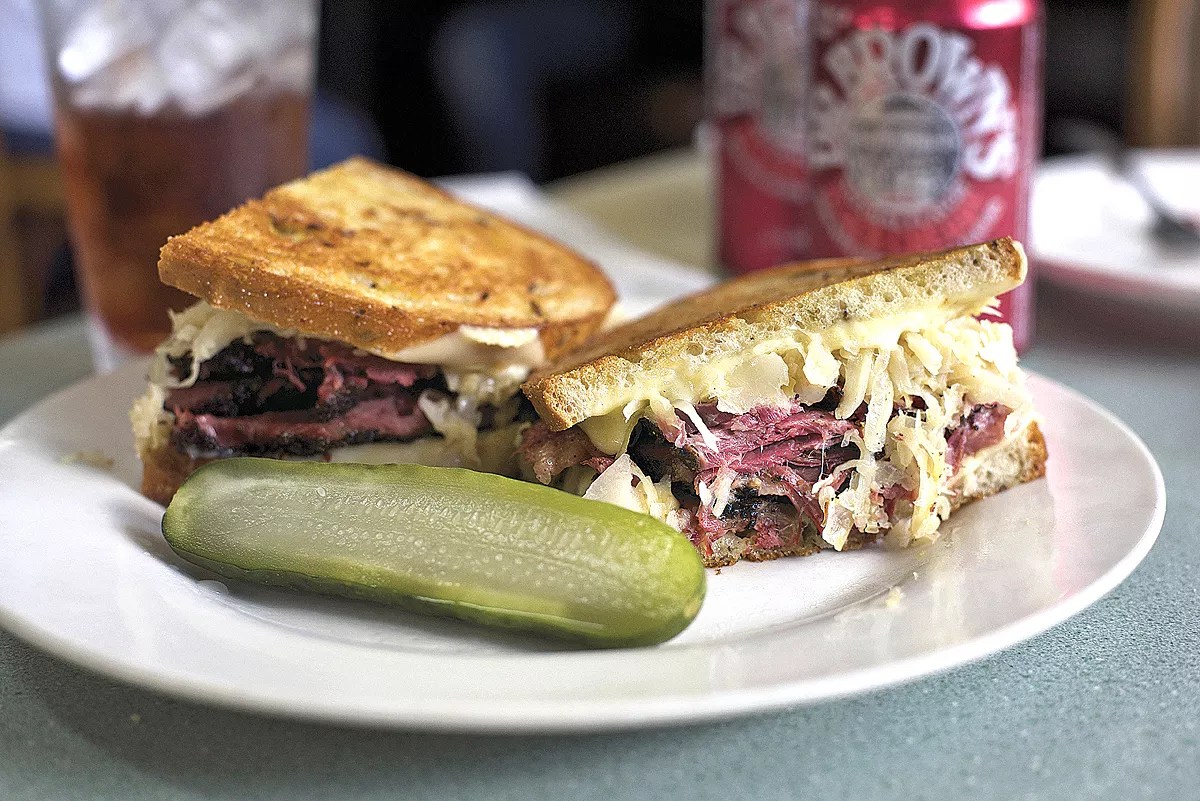
The Rachel sandwich at Stephen’s Restaurant is a staple.
Hussin Mohamed, who goes by Mo, is perhaps Miami-Dade’s most successful deli entrepreneur. The 54-year-old, who wears silk patterned button-up shirts and a gold chain around his neck, in 1995 founded Mo’s Bagels, a large restaurant on NE 187th Street just off Biscayne Boulevard.
Mohamed is Muslim, but for years he told customers “Mo” was short for “Moshe,” a common Jewish name.
“You’ve got me, a Venezuelan-American Jew; and Mo, an Egyptian Muslim. That’s what a deli is about.”
“I thought my name would affect business,” he says with a thick Egyptian accent. “But it didn’t. It actually helped. People were really accepting. Now it doesn’t bother me at all.”
When Mo left Alexandria, Egypt, for the United States in 1984, he had never tried the matzo balls, gefilte fish, potato kugel, and brisket preferred by many of his clients today. He grew up eating traditional Egyptian fare, heavy on lentils and spices. His favorite dish was lamb chops.
Two of his brothers had left Egypt a few years earlier – one for Sweden and the other for Italy – but both had quickly returned home after struggling to assimilate.
Mo didn’t speak any English when he began washing dishes at Pumpernik’s. For five years, he sent part of his salary to help support his parents, who ran a small vegetable market and then a restaurant in Egypt.
“I was trying to make as much money as I could to send back home,” he says. “My plan was to return to Egypt a few years later and finish law school, but I realized I’d make more as a dishwasher than I would as a lawyer.”
In 1988, after Pumpernik’s closed, Mo picked up work at Bagel Cove, a New York-style deli in Aventura that had just opened. “I learned how to cut the meats and the fish. It wasn’t easy. I came home with a lot of scars,” he remembers.
As Mo climbed the ranks, he went from making a few hundred dollars a week to more than $40,000 a year. He was promoted to junior partner at Bagel Cove but then left in 1995 to open his own place. With a $350,000 investment and a partnership with Jay Mazen, a former Bagel Cove customer, he opened Mo’s Bagels on NE 187th Street.
“I wanted to name it Bagel Time,” Mo says. “But Jay said I needed to name it Mo’s. He told me: ‘People will want to come here because Mo is here. The only name that makes sense is Mo’s.'”
After a few years, Mazen pulled out, and Mo found a new partner, who helped expand the bakery and catering services, increasing sales to about $1 million per year.
In 1998, Mo’s mother, Nama, who was in her early 70s, traveled to the United States for the first time to visit her son’s deli. His father stayed home. “She was very proud,” he says. “My mom and dad both think of the deli as a business. They don’t associate it with religion, so there was never a problem.”
In 1999, Mo met his future wife, Maryam Djawadi, at a Publix supermarket, where she mistook him for an employee. He asked her on a date, and she accepted. They married two years later and then had two boys: Amir in 2003 and Andrew in 2004. “About seven years ago, I took my two kids and my wife to see my mom,” he says. “It was a big surprise. I don’t like to go back to Egypt. I feel more at home in Miami.”
In February 2002, Paul Kruss, a slender 57-year-old with short dark hair and a smile so big it makes his cheeks crinkle, became Mo’s third business partner. Kruss, who lives in the area, thought it would be a good way to get more involved in the community. “You’ve got me, a Venezuelan-American Jew,” Kruss says with a grin, “and Mo, an Egyptian Muslim. That’s exactly what a deli is about. We’ve brought a lot of people together here.”
Says Mo: “Customers don’t give a shit about my religion. People love me for me and respect what I do. You could be a real Jewish man from Israel but not help the community. It doesn’t matter where you’re from; it matters what you do.”
But it wasn’t always like that.
“Shortly after I opened Mo’s, my competition was saying customers shouldn’t come to my store because I was an Arab and not Jewish,” he says. “My friends gave me a kippah – a small religious hat – and a large Jewish star necklace. They taught me a few Hebrew words, like shalom, and told me that I would be fine… It helped me in the beginning.”
Over the years, Mo’s Bagels has become a stop for politicians. “Rick Scott has come in several times, and Charlie Crist used to campaign here a lot,” Kruss says, adding that Ileana Ros-Lehtinen and Rudy Giuliani are also frequent visitors.
“Some people call us the Versailles of North Dade,” he adds, referring to the Little Havana restaurant that is a regular pit stop for candidates.
Mo’s Bagels’ menu is similar to those at classic delis: a large laminated card with hundreds of offerings, from Hebrew National hot dogs and vanilla-cream-filled blintzes to slices of pastrami on rye. Mo’s even hand-rolls and bakes 120 dozen bagels daily.
The food is kosher-style, not kosher. Though it offers traditional Jewish food such as fresh challah and noodle pudding, the eatery is open Saturday and will smack American cheese on any meat sandwich.
As for religion, Mo says, “I’m a really bad Muslim,” he laughs. “I eat pork, go to the casino, and drink alcohol. But I believe in God in my heart.”
Those beliefs are what Mo instills in his sons. Though Mo and his wife were raised Muslim, they expose their sons to various cultures. “I’ve made the Jewish culture my own and given that to my kids,” he says. “They’ve grown up on bagels and tuna salad.”
To Kruss, Mo is “more Jewish than you and the next guy put together… You know, I’ll never forget when a little old lady said to me: ‘He seems like a nice guy, but how is it working with an Arab?'” Kruss recalls. “I said and I always say, ‘He’s more Jewish than you’ll ever be!'”
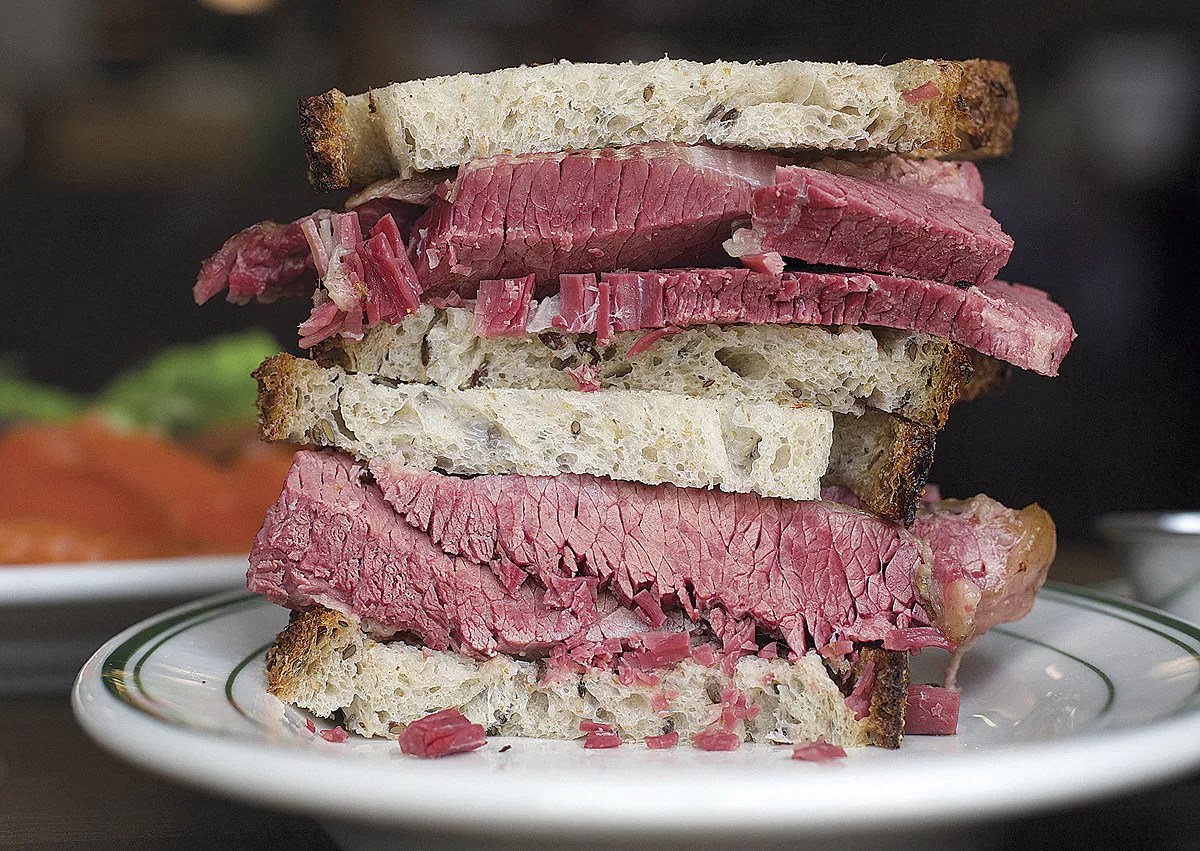
Corned beef sandwich at Zak the Baker Deli.
Late on a rainy Friday morning, seven customers holding jet-black umbrellas wait outside a nondescript converted warehouse on NW 26th Street in Wynwood. A sign bearing a single word, “Deli,” hangs over the door. The smell of freshly baked challah pours out as a baker doused in flour with her hair pulled back carefully opens the door. She lets the customers enter one by one and then quickly closes the door. Humidity can be toxic to bread, she explains.
The diners take their places at communal tables arranged around a deli counter in a sparse room already filled with Orthodox Jewish men in black trousers and white buttoned shirts, and middle-aged women sporting Lululemon athleisure.
This, 32-year-old deli owner Zak Stern says as he takes orders on a glossy iPad, is a “modern-day traditional delicatessen.” There are no signed photos of celebrities. The menu – which includes salty fish sandwiches with pickle plates of crisp brined cabbage, cucumber, and wedges of green tomato – pays tribute to traditional Eastern European fare rather than Brooklyn. And unlike Wolfie’s or Corky’s, Stern’s deli embraces age-old rituals, like keeping kosher and understuffing meat sandwiches.
“Many of the delis that exist in the U.S. are modern evolutions of the original deli, where they’ve gotten further and further away from the original concept,” he says. “I’m more focused on telling the story of food from my immigrants and ancestors. If they were to open a deli today, what would it look like? That’s my goal.”
Stern was raised a dozen miles south of his deli, in the Falls area of Kendall. He grew up in a culturally Jewish household but wasn’t particularly religious. He graduated premed from Florida State University in 2007 and enrolled in pharmacy school in Atlanta. But then something clicked. He craved a connection with nature, so he dropped out and returned to Miami to work and live at Bee Heaven Farm in Homestead, where he stayed for about six months. Then the travel bug hit, and he left to spend nearly five years apprenticing and farming in India, Sweden, France, Israel, and Italy. He learned how to grow vegetables, make goat cheese, and, most important for his future, bake sourdough bread.
In 2011, he returned home and began traditional European-style bread-making in a friend’s South Miami garage. He sold his loaves to Steven Perricone, the owner of Perricone’s Marketplace & Café in Brickell, who encouraged Stern to take samples to James Beard Award-winning Miami chef Michelle Bernstein. After tasting a few of those samples, she requested regular deliveries of his bread for her then-renowned restaurant, Michy’s.
Eventually, he increased production from about 70 loaves per day to about 280 by moving the operation to a small commissary kitchen in Hialeah. He sold the fresh, crisp-crusted sourdough to high-end establishments such as Panther Coffee and Oak Tavern.
Around the same time, Batsheva Wulfson, a 24-year-old Israeli whom Stern had met in a café in Israel, and her older sister Chedva traveled to Miami to apprentice at the bakery. After months of developing a friendship, a kiss sparked the pair’s engagement. Six months later, they wed in Israel. Today they raise two daughters, ages 2 years and 6 months, in a kosher household.
In 2014, the couple moved their business to a small retail space at 405 NW 26th St. in Wynwood, with an oven capable of baking 140 loaves an hour.
“Wynwood seemed to be one of the only neighborhoods that had some counterculture,” he says. “It was attracting local independent businesses, and that’s where I wanted to be. It felt like a small town.”
With a clean look and small wooden tables and chairs, the bakery attracted hundreds of customers every day, though only 15 to 20 people could dine at a given time. The menu included breakfast sandwiches stuffed with thin omelets and sharp cheese, as well as avocado toast (a chunky mixture of emerald-hued avocado crowned with cherry tomatoes and cilantro on bread). The place was a smash, both because of the fresh food and the neighborhood.
In 2015, Stern secured a deal with the Whole Foods Market in downtown to sell his bread. That arrangement quickly expanded to all Whole Foods locations across South Florida, as well as an ever-growing list of Miami restaurants, including Glass & Vine in Coconut Grove and the Continental in Miami Beach.
His food was such a success that on Thanksgiving morning in 2016, he opened a second bakery, at 297 NW 26th St. There, an oven began churning out up to 3,000 deep-brown loaves per day. He says he was approached by investors who wanted him to expand to cities such as New York City and Dubai.
A couple of months later, he launched a second concept: a more traditional Jewish delicatessen inside the bakery, where he replaced the avocado toast with ritual plates such as carrot, cucumber, and beet salads with slices of corned beef. Instead of offering hundreds of dishes, as is common in ’50s-style delis, Stern serves fewer than 30. (He plans to add more items but notes the menu will remain exponentially smaller than those at other delis.)
There are classics too, including two corned beef sandwiches: a breakfast version that tops a vegetable omelet with a few slices of cranberry-colored beef, and a traditional one smeared with house-made mustard. There’s also a fish salad sandwich made with smoked blue runner, native to South Florida’s waters. And there are lox and potatoes, a tongue tartine topped with a fried egg and schmaltz, and an assortment of platters where a choice of meat is paired with crudités and bread.
When the bakery opened, Stern hired a mashgiach, whose job was to oversee the shop’s kosher status. “Making the bakery kosher is all because of my religious wife,” he says. “To be honest, I didn’t know what I was getting myself into. To close every Saturday, on the biggest day in Wynwood, is a lot. But I have to meet the highest standards of what it means to keep kosher.”
Stern has tried to make traditional the new trend.
“The food is dying,” he says, “but I’ve made it my mission to make a deli in a way where we can bridge the gap between kosher and nonkosher.”
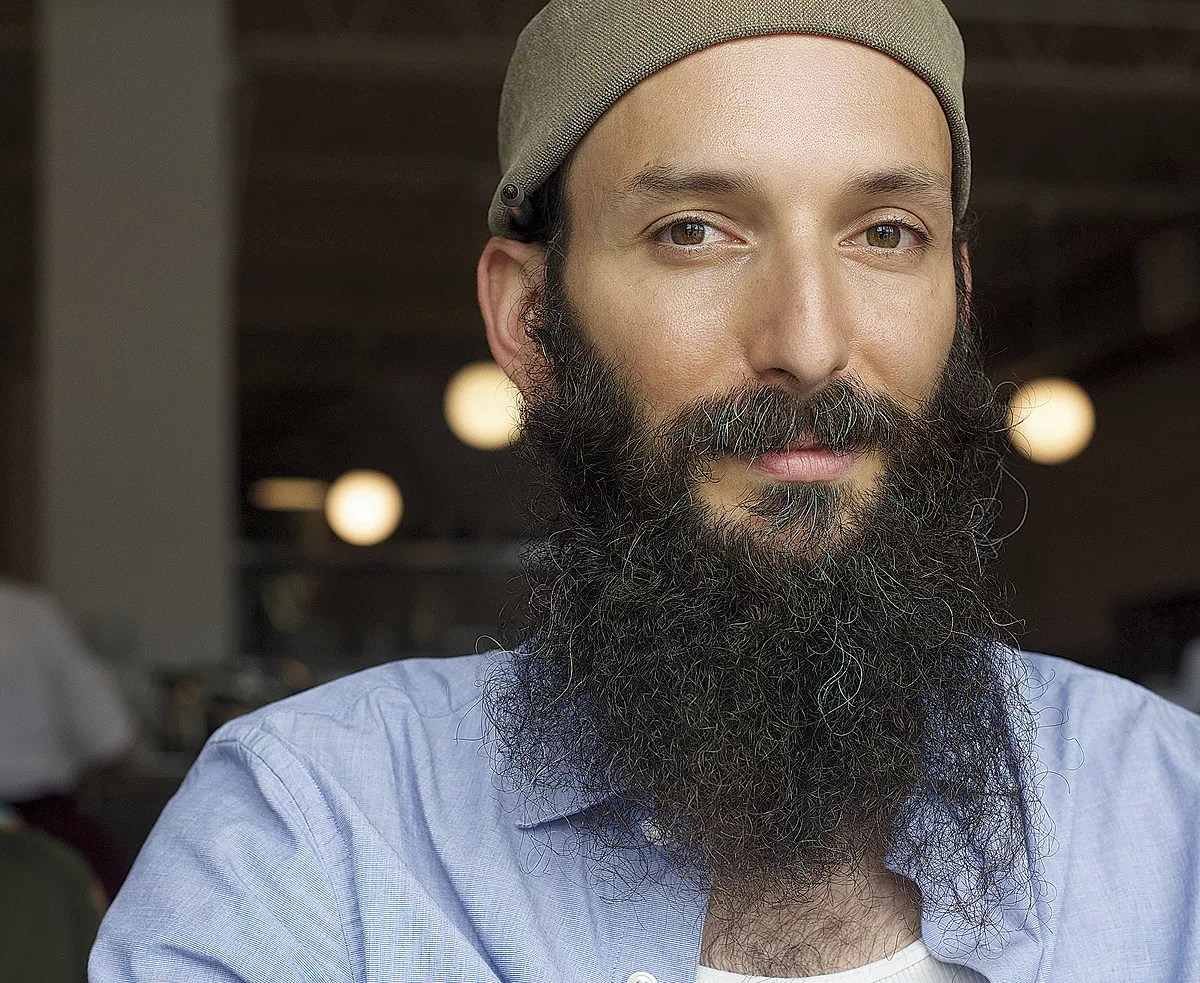
Zak Stern: “I’ve made it my mission to make a deli in a way where we can bridge the gap between kosher and nonkosher.”
Zak Stern is not the only one who aims to find a new way for the deli business. A handful of other spots are trying to change the game.
At Josh’s Deli on Harding Avenue in Surfside, chef/owner Josh Marcus believes traditional delis died years ago. “You can’t always sell nostalgia,” he says.
Josh Marcus believes traditional delis died years ago. “You can’t always sell nostalgia,” he says.
He describes his small restaurant, which opened in 2012 with about 20 seats, as a “deli done wrong.” Before opening, he had worked at multiple well-known Miami establishments, including La Sandwicherie, Timo, and BLT Steak. Marcus, who sports a thick black beard and often wears a backward baseball cap, has grown a following through his modern-day interpretations of deli classics, like matzo balls spiked with ginger beer and spicy tuna latkes topped with sriracha cream cheese.
“I stretch the definitions of what a deli is and what a restaurant is,” he says. “I would never just say I’m a deli. There are so many places that do the eggs, bagels, whitefish, and egg salad. How many people can you really serve? I don’t think it’s sustainable.”
One of his most famous menu items is the Jewban, a pressed sandwich that blends pastrami and roast pork – which many observant Jews are prohibited from eating – with house-made pickles, mustard, and Swiss cheese on crunchy Cuban bread. It’s how Marcus strives to stay relevant. “I want to push the boundary of what a deli is,” he says. “I don’t really attract an elderly clientele.”
Another place pushing the envelope is Bagel Cove, a deli that opened in 1988 on Biscayne Boulevard at NE 190th Street in Aventura. It launched 24-hour service in November 2016. Even at 4 a.m., customers can ring a doorbell at a takeout window a few steps from the restaurant’s front door for on-demand service on the patio. They can order everything from corned beef sandwiches to garnished bagels and soup until 6:30 a.m., when the dining room opens for service.
On Lincoln Road in South Beach, Hank & Harry’s opened in February 2017, blending a Jewish-and-New York-style delicatessen with Italian influences. Created bySouth Florida-based restaurant groupSliderz MG, the eatery offers a menu that mixes corned beef and pastrami with hot Italian sandwiches and meatball subs. Before year’s end, a second location, at 5958 S. Dixie Hwy. in South Miami, is slated to open. Plans are to franchise the concept.
“We’re trying to add a modern twist on a traditional deli,” says Sliderz CEO Buzzy Sklar. “Our office is really close by, and we’ve noticed that there isn’t a casual option to get a soup and a sandwich anywhere near here even though there used to be so many delis in this area. So we thought, Hey, why not make our own?“
The 63-year-old granddaddy of them all, Stephen’s Restaurant in Hialeah, is also planning a transformation. Owner Jack Frisch aims to couple the old-school charm with a fashionable cocktail bar to draw younger customers during the evening.
“There are so many millennials who live around here,” he says. “The closest place to drink is Hooters.”
Within the next year, Frisch plans to renovate the restaurant and possibly expand onto a neighboring plot of land. He’d like to maintain Stephen’s traditional character during the day but transform the restaurant into a “gastrobar” concept in the evening with a fully stocked bar, live music, and extended hours, with some nights stretching until 3 a.m.
“I want to keep the menu relatively the same,” he says. “Basically, I just want to update the place, like give it a modern and industrial look with a slight retro feel: something you might see in New York nowadays.”
Frisch still plans to serve breakfast and lunch to his regular clientele, which consists of local professionals, police offers, and senior citizens.
Andrew Miraglia, an 83-year-old Jewish man from the Bronx who eats lunch at Stephen’s every afternoon, is nevertheless skeptical of the idea to tweak the concept. “I play poker every day at the Miccosukee casino,” he says, “but I’ve got to eat. I never get tired of the food here, and it’s always good, so why change it?”
Says Frisch: “There is no doubt that we are going to keep the old flavor of Stephen’s alive here, even if we’re open at all hours. You’ll always be able to get a corned beef sandwich, just now with a beer or a cocktail.”